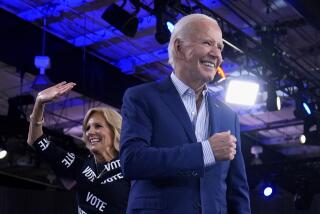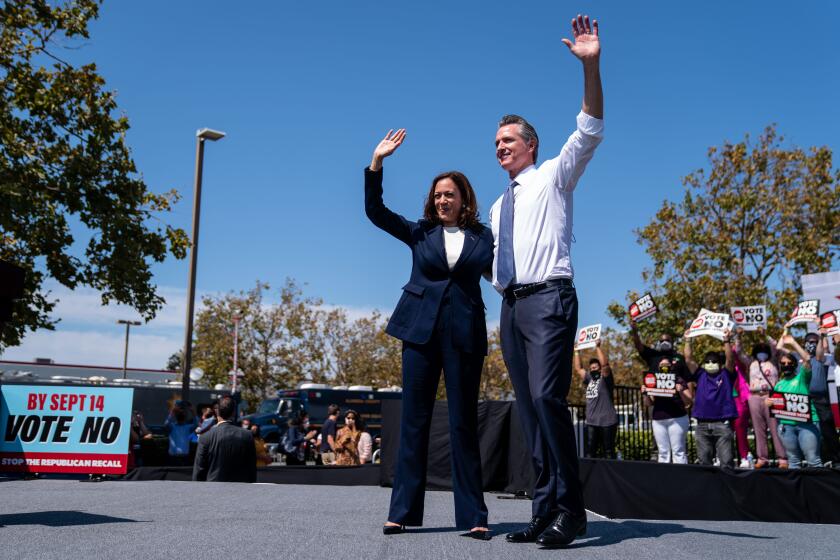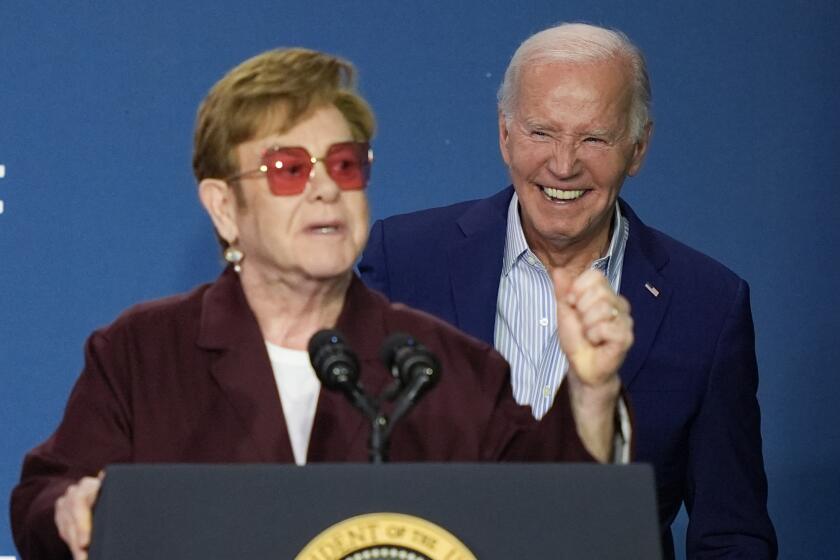Gov. Proposes Bond Measure of $15 Billion
On his first full day as governor, Arnold Schwarzenegger proposed putting a $15-billion bond measure before voters in March, saying long-term borrowing is necessary just to clean up the deficit he inherited from Gray Davis.
“We have to now do the kinds of things to make good for the damage done in the last few years,” the governor said Tuesday. “We’re not here to point fingers at anyone. That time is over. It’s not the election now. It’s just this is the reality.”
Schwarzenegger also said he would ask voters to approve a cap on future state spending, to prevent crippling deficits from occurring in years to come.
The governor provided no details on the cap, which will be complicated to craft, and his proposals were met with skepticism by leaders of the Legislature, which must approve them by Dec. 5 to make the March ballot.
“To basically go into more debt in the future general fund, to do this is questionable,” said Senate President Pro Tem John Burton (D-San Francisco).
Noting that Schwarzenegger had not yet proposed spending cuts and that the borrowing would do nothing to help balance the 2004-05 budget, Burton said: “I think they’re starting to learn. They’re going to dance as fast as they can because this is a very, very serious, difficult situation. If you say no education [cuts], no taxes, you need that magic wand.”
The budget proposals were the centerpiece of a wide-ranging news conference that marked Schwarzenegger’s debut. Holding forth in a local auditorium to accommodate scores of journalists from many countries, the governor mixed serious policy discussion with lighthearted bantering for 28 minutes. He reaffirmed his commitment to repeal the law that allows illegal immigrants to obtain driver’s licenses and said he would soon propose changes in the workers’ compensation insurance program.
The flurry of proposals was designed to make maximum use of the leverage Schwarzenegger has as a popular governor elected by voters who have told pollsters they are angry with “politics as usual.”
Schwarzenegger offered no suggestions of budget items that he would propose to cut -- beyond saying that he would forego his own salary of $175,000 -- but promised $2 billion in unspecified cuts.
“I’m working right now with the legislators and Democrats and Republicans,” he said. “Each one of them will want to present to us their package and their ideas. And as I said yesterday and in the past, we want to make this not a Democrat or Republican kind of thing, we want to make it bipartisan. Have both parties come together and present their great ideas. That’s why we don’t have any specifics right now.”
Democratic leaders insisted that it’s the governor’s responsibility to suggest how to balance the budget.
“When they call a special session, the ball is in the governor’s court,” Burton said.
Republicans praised the governor’s initiative.
“He is delivering on his promises,” said Assemblyman John Campbell (R-Irvine). “He said he was going to lower the car tax. He did. He said he was going to repeal the driver’s license bill. He is. He talked about seeking a spending limit. He is. And he promised to deal with workers’ compensation as the biggest drag on the economy, and he is. It’s quite remarkable what he has done in 36 hours.”
A few hours later, after a “Big Five” meeting of the new governor and the four legislative leaders, Assembly Speaker Herb Wesson (D-Culver City) said: “He’s given us a skeleton. We’d like to see more meat on the bones.”
Wesson’s own tenure may be in jeopardy. Members of the Democratic caucus were nearing a vote on whether to replace him, a move that could further slow legislative action.
To balance this year’s budget, legislators included more than $12 billion in borrowing that has yet to take place because of legal challenges. If voters approve Schwarzenegger’s proposal, it would remove the legal concerns but not address the fiscal ones.
Borrowing for as long as 30 years to cover current expenses is considered poor fiscal practice. Some Wall Street analysts voiced skepticism about the bond proposal, noting that it also does not help the state balance its budget beyond July 1.
“It looks like you are moving sideways,” said David Hitchcock, public finance ratings director at Standard & Poor’s bond rating agency.
Earlier proposals floated by the governor’s staff called for larger borrowing, which could have helped balance next year’s budget but might have jeopardized the state’s credit rating. Hitchcock said there was concern about whether the market could handle the larger bond.
State Treasurer Phil Angelides, whose office would have to sell the bonds, said he opposed the idea, saying it was “ludicrous” that Schwarzenegger’s first budget proposal is to borrow more money.
“It does not move us one inch closer to a balanced budget,” said Angelides, a Democrat expected to run for governor in 2006. “I cannot think of when I have ever seen the first move out of the box being substantial borrowing.”
Republicans said the bond measure, while unpopular, would be worthwhile if tied to a spending cap.
“Nobody likes bonds,” said Assemblyman Kevin McCarthy (R-Bakersfield), who will become the Republican leader of the Assembly in January. But Schwarzenegger’s proposals will clear up the inherited debt, he said, and prevent future borrowing.
“If we have the cap,” said McCarthy, “we’ll have to prioritize. Structure dictates behavior.”
Assemblyman Mark Wyland (R-Escondido) said he would “reluctantly support the idea of a bond tied to a spending limit.”
Assemblymen Keith Richman (R-Northridge) and Joe Canciamilla (D-Pittsburg) on Tuesday introduced a spending cap proposal that would force the state to save money when revenues are flush. It is one of several plans likely to be put forward. Spending caps are complicated by constitutional requirements that drive money into certain programs, primarily education.
Schwarzenegger described the spending cap as a means of avoiding the multibillion-dollar budget shortfalls that have occurred in recent years. A spending limit, he said, would “prevent future financial disasters [and] never again allow politicians to recklessly overspend.”
In a memo shared with the Legislature, Schwarzenegger’s office said he would not sign the bond measure unless lawmakers also place the spending cap on the March ballot.
Schwarzenegger said the bond issue would “consolidate the debt [caused] by reckless spending in recent years. It will allow us to move forward to recovery without cutting schools.”
Schwarzenegger’s announcements Tuesday track promises he made during the recall campaign. He also called for passage of a measure that would open government to greater scrutiny. Once such a law is in place, he said, he would abide by it and make available his personal schedule -- something California governors are not required to do.
On the driver’s license law, which was signed by former Gov. Gray Davis during the recall campaign, Schwarzenegger repeated what he had said on the stump -- that the bill was a device to help Davis shore up support.
“We want to get rid of it,” he said. “It was done the wrong way. As I’ve always said, it was one of those preelection packages.”
As his aides have indicated he would, the governor is using a two-pronged approach in advancing his early agenda -- sending conciliatory messages to the Democratic-controlled Legislature but also making clear that he is willing to put his ideas directly in front of voters if the Legislature balks.
On workers’ compensation, for example, Schwarzenegger’s aides said the governor would seek a legislative solution to reduce costs by $11 billion. But if the Legislature does not approve a bill he finds acceptable, he would move to put his proposals on the November ballot.
The Legislature must act by Dec. 5 to place any measures on the ballot for the March 2 election, according to the secretary of state’s office. The new governor appeared relaxed at his mid-morning press conference. Teasing the journalists clamoring to ask a question, he said, “Governor, governor, governor ... “
After calling on a Times reporter, he complimented the beard and glasses that the reporter was sporting.
“This is what Sen. Jim Brulte [R-Rancho Cucamonga] taught me yesterday,” he said. “When we went to the lunch at the [Capitol] Rotunda, he said, ‘Let me give you lessons on how to deal with the Legislature and the press.’ So he said, for instance, ‘When you talk to me, Arnold, say to me, Hey, Jim. I like your six-pack. Your abs look really good. Then we’ll vote for everything you want.’ I’m trying it out right now.”
As he was leaving the podium, he stopped to give an interview with the Washington, D.C., bureau chief for the Austrian Broadcasting Corp. It seemed a spontaneous move on the governor’s part -- something he suggested the state can expect.
“Lot of things for the first time,” he said. “It’s the first time we’ve had an Austrian as governor. The first time we’ve had such a huge budget deficit. We’ve never had a situation like now.”
*
Times staff writers Gregg Jones, Joe Mathews and Nancy Vogel contributed to this report.
More to Read
Get the L.A. Times Politics newsletter
Deeply reported insights into legislation, politics and policy from Sacramento, Washington and beyond. In your inbox three times per week.
You may occasionally receive promotional content from the Los Angeles Times.






